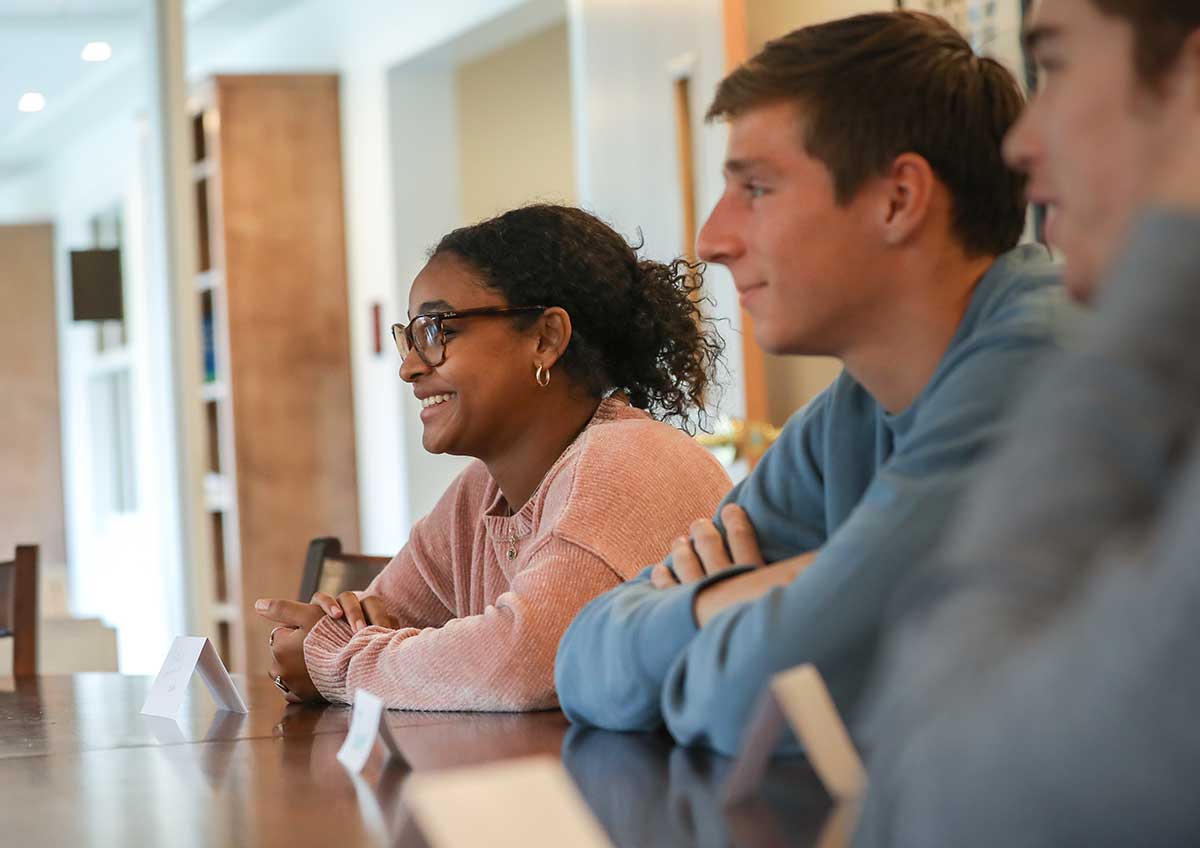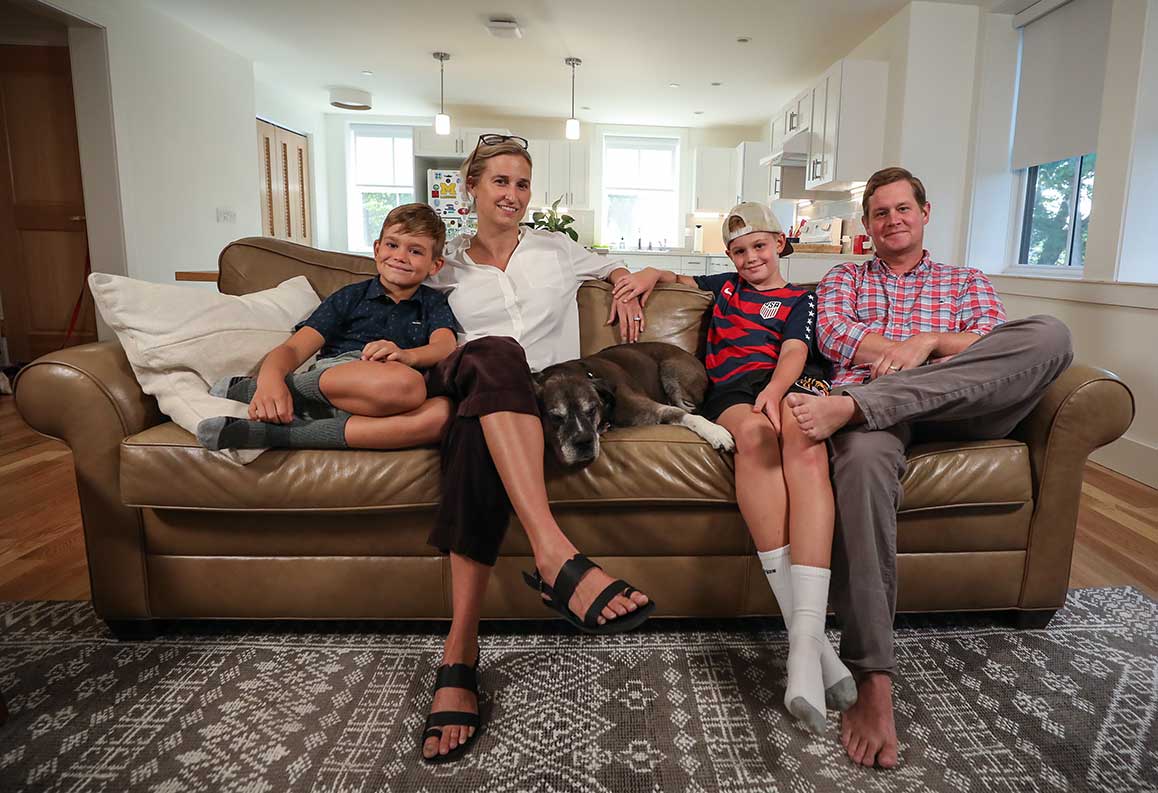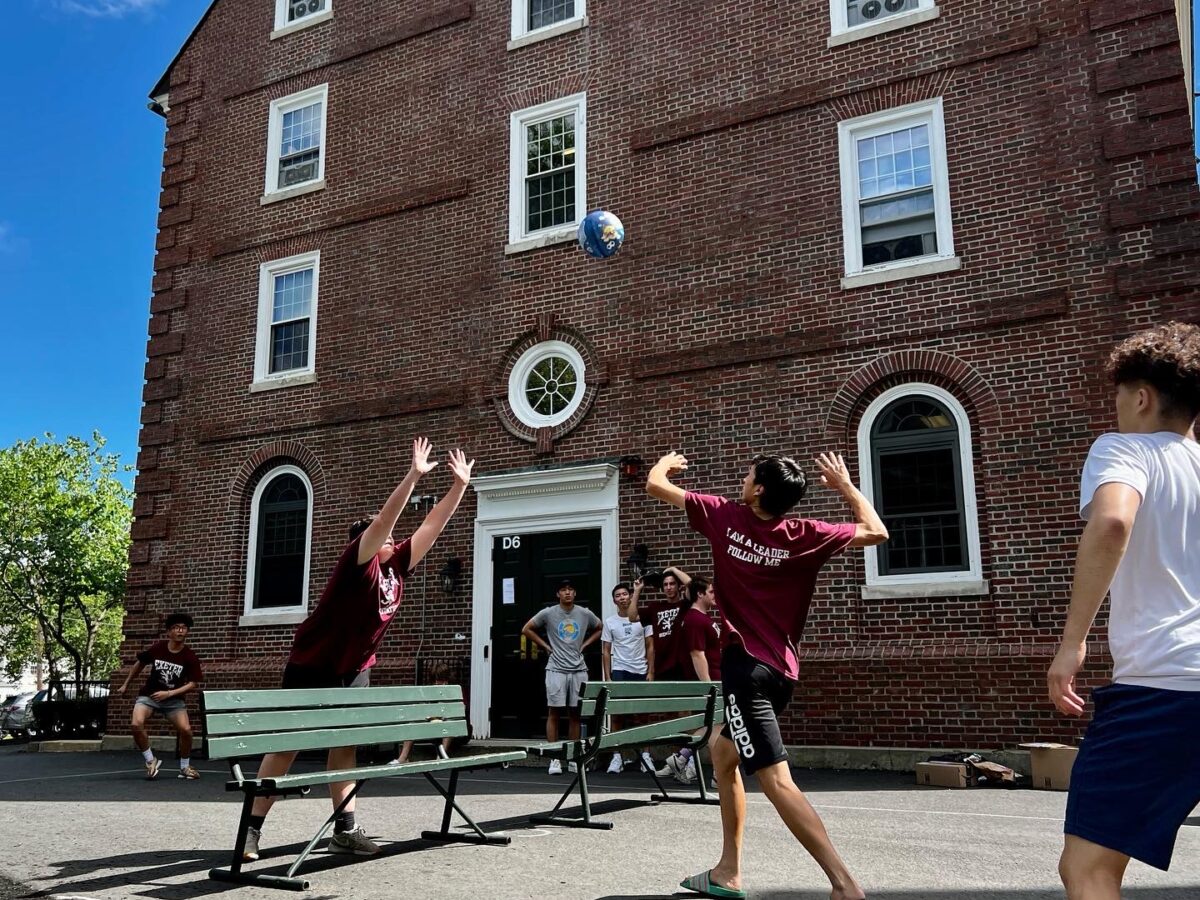Healthy living and learning

Exeter’s Health and Human Development Department makes its home in New Hall.
To accommodate its expanding academic curriculum, as well as the Academy’s commitment to promoting students’ physical, mental and emotional wellness, Exeter’s Health and Human Development Department now makes its home into the spacious lower level of New Hall dormitory after years in the Lamont Health and Wellness Center.
New Hall’s academic space features four Harkness classrooms, a departmental office and a flexible lobby that can be used for group activities such as yoga, meditation and cooking, or just relaxing and connecting when not in class. Bookshelves lining the walls are home to an expanded library of health- and wellness-related books that students can browse and borrow.
While living and learning are kept securely separate — dorm residents have to exit the building to access the academic space — every Exeter student has the opportunity to take classes in New Hall. “It used to be that only ninth graders and new 10th graders took health,” Department Chair Michelle Soucy says. “Right before the pandemic, we changed it, and now students from all four years take at least one class in Health and Human Development.”
In addition to introductory courses aimed at helping all new students acclimate to the school, the Health and Human Development curriculum includes a Teen Health course for each class year, including one designed to help prepare seniors for life beyond Exeter. “We cover finances, learning to cook for yourself, and a bunch of other stuff for what we call the emerging adult phase of life,” Soucy says.
In the courtyard outside the building’s entrance, a circular medallion with the words “youth from every quarter” and an engraving of a lion rampant adorn a stone wall. An anonymous donor intended the medallion, and a soon-to-be- installed stone bench, to serve as a corner of campus dedicated to wellness reflection. The feature complements one of the department’s long-running fall programs, a positive psychology fair where students gather to paint and decorate rocks with messages of positivity. “We’re envisioning that we’ll have a little rock garden there as well,” Soucy says. “We’re always talking about the psychology of looking at things in the positive, and how you can raise your mental health.”
Editor’s Note: This article first appeared in the fall 2022 issue of The Exeter Bulletin.












 From there, she worked at The Advisory Board Company in Washington, D.C., engaging in best-practice research with health systems across the country. She now serves on the board at her sons’ school for autism, Nashoba Learning Group, and the Lurie Center for Autism at Massachusetts General Hospital. Through the Operation House Call program at The Arc of Massachusetts, Basak teaches medical students at Boston University Medical Center and Harvard Medical School about treating individuals with developmental disabilities. An elected director of the GAA since 2018, she became a GAA vice president this year.
From there, she worked at The Advisory Board Company in Washington, D.C., engaging in best-practice research with health systems across the country. She now serves on the board at her sons’ school for autism, Nashoba Learning Group, and the Lurie Center for Autism at Massachusetts General Hospital. Through the Operation House Call program at The Arc of Massachusetts, Basak teaches medical students at Boston University Medical Center and Harvard Medical School about treating individuals with developmental disabilities. An elected director of the GAA since 2018, she became a GAA vice president this year. Sam Maruca entered as a prep from Lawrenceville, New Jersey, and lived in Bancroft Hall, Dunbar Hall and Lamont Hall. He was active in the glee club, orchestra, student government and basketball, and “majored” in classical languages. Maruca received a B.A. with honors in American studies from Yale College. After graduation, Sam worked for the House Administration Committee of the U.S. Congress and as a law clerk, while attending Georgetown University Law Center as an evening student. He served on The Georgetown Law Journal staff and graduated in 1982. During a long career in private practice in Washington, D.C., Maruca specialized in large case dispute resolution in the international tax field. He is currently senior counsel with Covington & Burling LLP and has an active pro bono practice. Maruca is the board treasurer of Capitol Hill Day School. Maruca has been an elected director of the GAA since 2018 and GAA secretary from 2020-22. He became a GAA vice president this year.
Sam Maruca entered as a prep from Lawrenceville, New Jersey, and lived in Bancroft Hall, Dunbar Hall and Lamont Hall. He was active in the glee club, orchestra, student government and basketball, and “majored” in classical languages. Maruca received a B.A. with honors in American studies from Yale College. After graduation, Sam worked for the House Administration Committee of the U.S. Congress and as a law clerk, while attending Georgetown University Law Center as an evening student. He served on The Georgetown Law Journal staff and graduated in 1982. During a long career in private practice in Washington, D.C., Maruca specialized in large case dispute resolution in the international tax field. He is currently senior counsel with Covington & Burling LLP and has an active pro bono practice. Maruca is the board treasurer of Capitol Hill Day School. Maruca has been an elected director of the GAA since 2018 and GAA secretary from 2020-22. He became a GAA vice president this year. Council; and worked in the Elm Street Dining Hall. He holds a B.A. with honors in English from Columbia College and a J.D. from Columbia University School of Law, where he served as editor-in-chief of Columbia Human Rights Law Review. Schmidtberger is the chair of the executive committee of the international law firm of Sidley Austin LLP. His principal areas of practice are securities and commodities-related funds and corporate transactions, including related regulatory matters. Schmidtberger has been on the board of directors of the United Way of New York City since 2011 and has served as co-chair since 2016. He is also a member of the Columbia College Board of Visitors, a representative to the Partnership for New York City and a trustee of the Citizens Budget Commission.
Council; and worked in the Elm Street Dining Hall. He holds a B.A. with honors in English from Columbia College and a J.D. from Columbia University School of Law, where he served as editor-in-chief of Columbia Human Rights Law Review. Schmidtberger is the chair of the executive committee of the international law firm of Sidley Austin LLP. His principal areas of practice are securities and commodities-related funds and corporate transactions, including related regulatory matters. Schmidtberger has been on the board of directors of the United Way of New York City since 2011 and has served as co-chair since 2016. He is also a member of the Columbia College Board of Visitors, a representative to the Partnership for New York City and a trustee of the Citizens Budget Commission.





